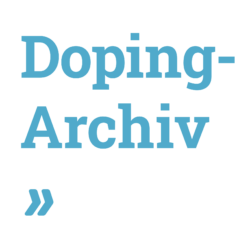NCJRS Virtual Library
WINNING AT ANY COST: DOPING IN OLYMPIC SPORTS
Date Published September 2000
This report by the CASA National Commission on Sports and Substance Abuse’s Technical Advisory Group (TAG) probes the use of performance-enhancing drugs by Olympic athletes.
Die Studie:
>>> CASA: Winning at Any Cost: Doping in Olympic Sports
A Report by The CASA National Commission on Sports and Substance Abuse
Die Studie wurde seitens des IOC heftig kritisiert, insbesondere folgende Passage:
„Estimates of prevalence of doping among Olympic athletes vary widely. The International Olympic Committee (IOC) and several National Federations administering drug testing programs indicate that less than three percent of athletes test positive for any banned substances. Other credible sources indicate use to be very much higher, including one report where Olympic officials estimate the actual number at 10 percent. Some veteran athletes put the figure at closer to 30 percent.3 At this rate, over 3,000 athletes would engage in doping for the 2000 Sydney Games. In cycling, prevalence estimates have been documented to reach as high as 45 percent. Some athletes, coaches and trainers believe that drug use in sports is much higher than any of these statistics suggest – up to 80 or 90 percent in some sports.5 While each of these data sources has particular strengths and limitations, together they present a disturbing picture of doping in Olympic level competition. Moreover, some experts believe doping among elite athletes will only get worse as technological advances continue to be made atbreakneck pace.“
The Washington Post: Drug Report Draws Ire of IOC, 10.9.2000:
„The nicest thing you can say about it is that it’s woolly [sloppy] as a study,“ International Olympic Committee Vice President Dick Pound said. „The worst you can say is that it’s been deliberately manipulative. It’s the most astonishing lack of the scientific method that I’ve ever seen.“
…
IOC members took exception to what they considered outdated and inaccurate material in the 107-page report issued last week, as well as to a lack of recognition of certain anti-doping advances recently undertaken. They further objected to the failure of the report to address drug-control issues in U.S. professional sports, which the IOC says is riddled with more pervasive drug use than Olympic sports.
„It’s not addressing the problems in your own country, the drug abuse in professional sports, androstenedione on sale over the counter,“ IOC executive board member Jacques Rogge said. „It’s not a well-balanced report. . . . There’s far less cheating in Olympic sports than in [U.S.] professional leagues.“
…
The IOC officials said the report was not discussed during today’s executive board meeting, but some officials obtained copies of it and read it anyway. Titled „Winning At Any Cost: Doping in Olympic Sports,“ it concluded that the financial rewards tied to using illegal drugs, combined with the proliferation of performance-enhancing substances and a faulty drug-testing system, lead to significant abuse.
Pound pointed out that the newly developed World Anti-Doping Agency, a semi-independent group that he heads, is not „ultimately limited to making recommendations to the IOC,“ as the report states.
He objected to the report’s section entitled „Recommendations and Next Steps,“ saying it ignored anti-doping advancements made recently by the IOC–such as increasing out-of-competition testing and expanding research–and that it suggested no such measures had been taken.
And both Rogge and Pound took particular exception to the statement in the report that some athletes believe 80 to 90 percent of athletes in sports take drugs–an estimate Rogge called „ridiculous.“ The IOC estimates drug use at about three percent.
„If I paid for a definitive report on doping and the total cost was $1 million, I would be very, very disappointed,“ Pound said.
Said Rogge: „We have learned nothing from the report. There is nothing new.“
